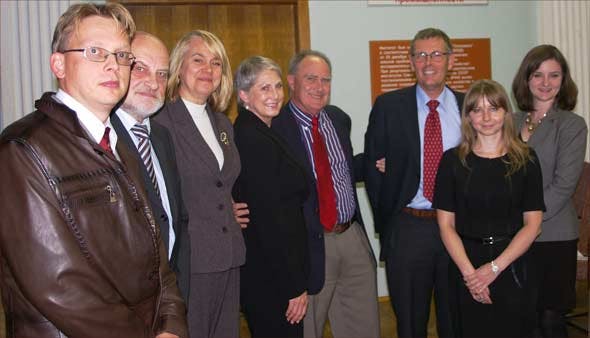USMEF-Russia Collaborates on Food Safety Seminar
Published: Oct 06, 2011
USMEF collaborated with the All-Russia Research Institute for the Meat Industry recently to put together a one-day scientific seminar in Moscow on food safety to educate Russian scientists, academics and regulators about international standards and practices in the development of risk-based food safety systems with a special focus on risk assessment and risk management.

The All-Russia Research Institute is considered Russia’s leading scientific and educational institution for the meat industry and its key opinion leaders are very influential. USMEF invited and hosted a group of international experts to present at the seminar. Attendees included representatives of Russia’s leading scientific institutions and laboratories along with representatives of Russia’s veterinary service and other government bodies.
The timing of the seminar is critical. Over the past two years, Russia has been going through the process of forming a Customs Union with Kazakhstan and Belarus. As a part of the process, these countries are working now to harmonize their food safety legislation. Once finalized, those regulations will determine the structure of each country’s food safety system. Many of the people who will be responsible for the formulation of the new technical regulations for meat safety in the Customs Union were among the seminar participants.
“Although today some scientists, academics and regulators recognize the need to change Russia’s food safety system, they face tough opposition from the conservative part of the scientific community and from bureaucrats and regulators,” said Yuri Barutkin, USMEF-St. Petersburg manager. “Hopefully, taking part in this seminar will assist Russia, Kazakhstan and Belarus in their efforts to harmonize with international standards for the betterment of their industry, and the safety of their consumers.”
The seminar’s keynote speaker was Dr. Karen Hulebak, past chair of the Codex Alimentarius Commission, who delivered a passionate speech on what Codex Alimetarius is, how it works and how to make it work even better. She called on Russia to harmonize with international standards in order to best benefit its market and country, allowing it to join the World Trade Organization (WTO), strengthen its economy and protect its consumers. She also strongly encouraged Russia to more actively participate in Codex Alimentarius committees.
“Our approach to this seminar was that the emphasis should be placed on international standards rather than on the food safety monitoring practices that exist in the U.S.,” said Thad Lively, USMEF senior vice president of trade access. “We attempted to make the seminar as objective as possible to avoid any potential accusation that we are ‘pushing’ U.S. points of view, which likely would create an opposite effect.”
Other speakers included Dr. Andrew Pointon of the South Australia Research Institute, who addressed risk assessment and risk management; Dr. Jens Andersen from the Technical University of Denmark, who discussed microbiological programs; and Dr. Dieter Arnold, private consultant and former head of the German Consumer Protection Institute, who spoke on the development and enforcement of veterinary drug residue acceptable daily intakes (ADI) and maximum residue levels (MRL). Each speaker emphasized the importance of a risk-based food safety system, the importance of utilizing Codex recommendations and participating in Codex.
Speakers from the Russian side included Oksana Kuznetsova, head of the Certification and Standardization Department, and Mikhail Minaev, head of the Laboratory for Production Hygiene and Microbiology, who addressed the Russia WTO accession and laboratory methods for monitoring residues and microbiological levels.
“The seminar generated heated discussions on various topics and good questions,” said Barutkin. “It was a good step toward opening up conversation on critical topics.”
